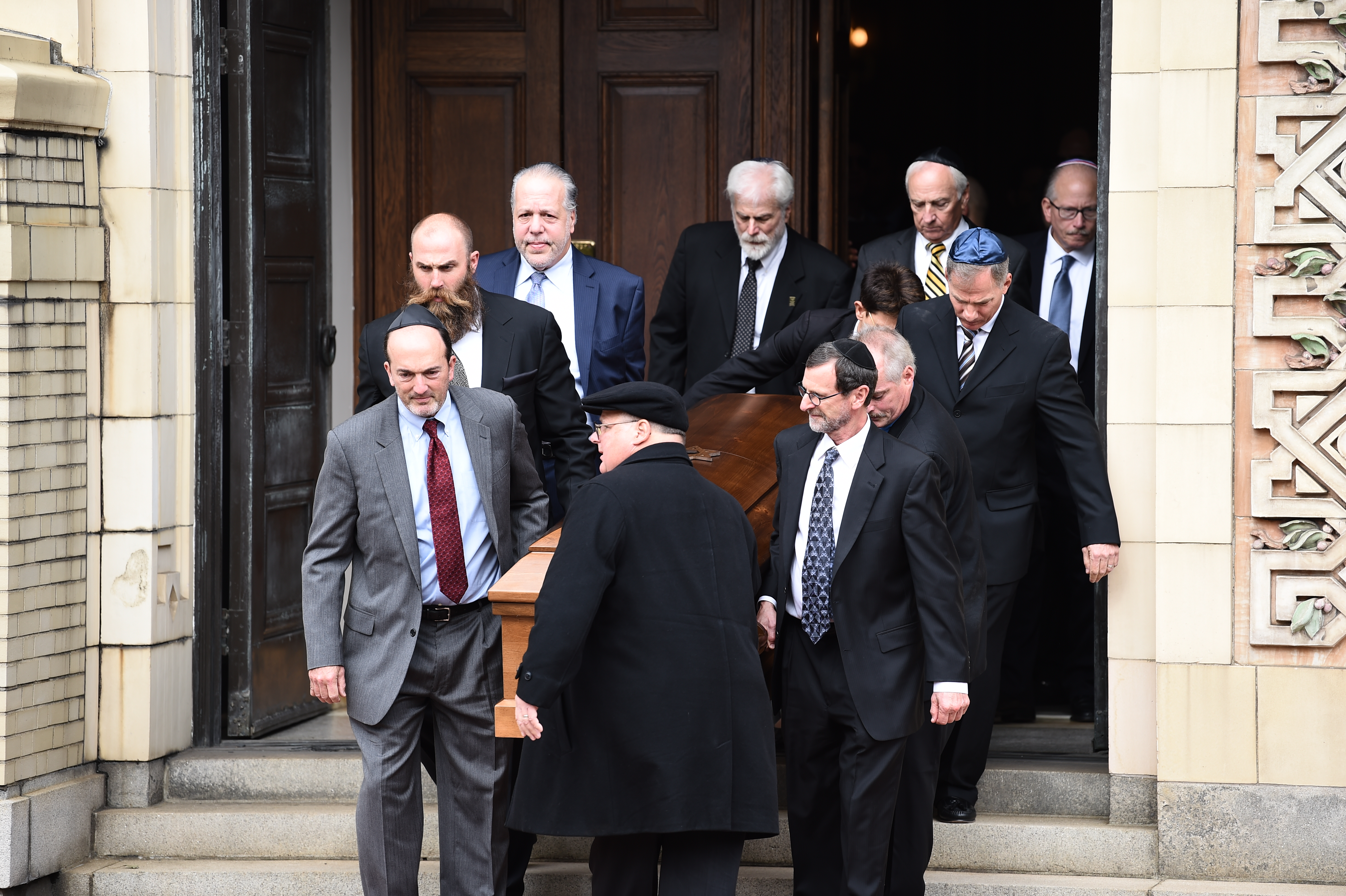Anti-Semitic and political violence rattle US midterm elections
A casket is carried outside the Rodef Shalom temple where the funeral for Tree of Life massacre victims Cecil and David Rosenthal was held on October 30, 2018 in Pittsburgh, Pennsylvania. (Brendan SMIALOWSKI)
Washington (AFP) – “This American carnage stops right here, and stops right now,” President Donald Trump said at his inauguration, describing a fractured society. Twenty-one months later, voters brace for midterm elections darkened by the specter of domestic terrorism.
Last weekend’s murder of 11 people at a Pittsburgh synagogue, days after an unabashed Trump fan allegedly sent pipe bombs to several of the president’s critics, has brought a painful new wrinkle to the election.
But while the week of deadly outrage, which included a white supremacist charged with the murder of two African Americans at a Kentucky supermarket, could motivate more voters to head to the polls, it is unlikely to shift many positions, experts and voters said.
“It’s not going to change how I’m voting, but I do hope it does open some eyes to people that you need to stand up to the bigotry and hatred wherever it is,” Gary Schermer, a retired teacher, told AFP as he visited a memorial for Tree of Life Synagogue shooting victims.
“You’ve got to call out people who encourage that, whether they encourage it directly or indirectly,” the 67-year-old Democratic Party supporter added, alluding to Trump and other politicians accused of contributing to the noxious atmosphere.
At a moment of deep national division, with the political temperature soaring, the upcoming November 6 poll is unquestionably a referendum on Trump.
Opposition Democrats, seeking to regain majorities in the US House and Senate, are highlighting what they see as his toxicity, while many Republicans embrace the president’s leadership style and conspiracy-mongering.
Even as the deadliest attack on Jews in recent US history, and the alarming act of politically motivated pipe bombs sent to figures like Barack Obama and Joe Biden, put American beliefs to the test, voters remain entrenched.
The violence “won’t move the needle either way,” said professor G. Terry Madonna, director of the Center for Politics and Public Affairs at Franklin and Marshall College, in Pennsylvania.
“My sense is that those events will have a reinforcing effect, not a transforming one.”
– ‘Fever pitch’ –
The current anxious and divisive political era could be traced back to Trump’s trash-talking presidential campaign, which kicked off in 2015 with his call for the death of political correctness and his accusation that some Mexican immigrants were “rapists” and drug dealers.
He kept the bombast at full tilt, calling for a ban on Muslims entering the country, branding his Democratic rival Hillary Clinton “the most corrupt person” ever to seek the presidency, and bragging he could shoot people on Fifth Avenue and not lose votes.
Horrified observers said Trump was fueling bigotry, and predicted his campaign would self-implode. Instead, his caustic talk helped him win the White House.
Today Trump’s raging rhetoric remains front and center, and in recent weeks he has sought to delegitimize the opposition, accusing Democrats of turning into an angry “mob.”
Several Democrats blame him for encouraging extremism.
Even as mourners gathered for vigils Saturday, Trump maintained his political schedule, attending a campaign rally in Illinois where he condemned anti-Semitism, then attacked his critics as “very stupid” people.
The White House, facing questions about Trump’s tone, insisted his political attacks are fair game, especially in a heated midterm season.
Several recent concerns have caught the electorate’s attention in addition to the violence, including the confirmation of Brett Kavanaugh to the Supreme Court, and a US-bound caravan of Central American migrants that Trump allies say is promoted by liberals.
“Kavanaugh and the caravan activated Republicans and the violence and bombs activated Democrats,” University of Virginia professor Larry Sabato said.
“We are going to have a high turnout, with people from both parties now at a fever pitch.”
Some Democrats, like strategist Doctor Dena Grayson, warn that the increasing normalization of hateful rhetoric has led Americans to “become immunized to these acts of violence, which is extremely disturbing.”
But there is also a call from within the party to not merely point fingers at Trump, but hammer home their core messages of improving health care and education, and providing opportunities for all Americans.
“Those are the issues that at the end of the day really matter to the voters,” Grayson said.
Disclaimer: This story has not been edited by Siliconeer and is published from a syndicated feed. Siliconeer does not assume any liability for the above story. Validity of the above story is for 7 Days from original date of publishing. Content copyright AFP.


